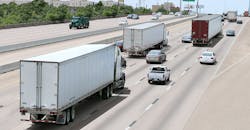The Trump administration is making good on a promise to roll back burdensome federal regulations, but now that the process in underway, the question becomes: Can the White House stay the course when faced with some ferocious opposition? An early test will be the Environmental Protection Agency’s proposals to exempt trailers and gliders from the Phase 2 greenhouse gas (GHG 2) rules.
A recent public hearing on the glider reversal drew dozens of angry opponents (including moms, nuns, scientists, healthcare providers, and several truck manufacturers and dealers) compared to just a couple of supporters.
Noticeably absent was a representative of Fitzgerald Glider Kits, the largest manufacturer of gliders in the country and the source of the appeal to EPA. But Fitzgerald has already made its argument in opposing GHG 2 in the first place, and then in successfully calling for a second chance: Gliders (new chassis powered by rebuilt engines) shouldn’t be regulated under GHG 2 since they’re not new equipment, and the rule’s inclusion of glider kits would effectively kill the industry.
That absence left the floor open to opponents.
Pat Quinn, executive director of the Heavy-duty Leadership Group, whose members include Wabash National, Eaton, Cummins, PepsiCo, FedEx, and Waste Management, was among those speaking out against the glider exemption. The group worked closely with EPA in the development of GHG 2 during the Obama administration.
Also making an appearance at the day-long hearing, Glen Kedzie, ATA vice president of energy and environmental affairs council, who stated ATA members’ opposition.
“It’s well-known that gliders are purchased to save money, avoid maintenance costs … and skirt federal excise tax payments,” Kedzie said, adding that ATA member fleets have paid $31,000 more on average per new truck since 2004 to comply with new emissions rules.
Indeed, as Susan Alt, senior vice president of public affairs, Volvo Group North America, pointed out, production of gliders has soared since stricter diesel emissions standards went into effect in 2010, going from just a few hundred per year to more than 10,000 in 2015.
Citing EPA’s own testing, Alt noted that glider vehicles emitted 43 times more NOx and 55 times more soot than today’s low-emission diesels. “The current annual impact of glider emissions already grossly outweighs that of the VW diesel engine violations in the U.S. at their peak,” she said.
Additionally, the glider loophole might save some Fitzgerald jobs, but it will hurt “a much larger number of small businesses,” such as Volvo dealers.
“The Clean Air Act is not at all ambiguous with regard to EPA’s authority to regulate glider vehicles,” Alt concluded. “A repeal of the Phase 2 glider provisions makes a mockery of the massive investments we’ve made to develop low-emission compliant technology.”
And Rep. Jamie Raskin of Maryland said he was “baffled and confounded” as to why EPA would consider a repeal. He noted that Fitzgerald had failed to secure legislative relief, so the company’s owners then met directly with Pruitt.
According to Raskin, Fitzgerald’s petition included new information on glider vehicle emissions which purported to show that gliders were less polluting than non-glider vehicles. But that “independent” study was bought and paid for by none other than Fitzgerald.
“It is important to note that the study, run by Tennessee Tech University, has been criticized by experts for its poor and shoddy quality and has provoked serious ethical questions about the university’s academic independence and its cozy relationship with Fitzgerald,” he said.
On the other side, glider builder and trucker Farrell “Dale” Clark Jr., president of D & B Trucks, said he fully supported the proposal, and he referenced the Fitzgerald-funded study. Clark stressed that the only new parts in a glider kit are the cab and the hood; the remaining parts of the truck are all used parts.
He also added an environmental benefit to the pro-glider case: “We really should be thanking our glider builders. We should be encouraging every trucker in this country to use a glider, or should I say a ‘recycled truck,’” Clark said. “This is exactly what we do in our business. We recycle old trucks, not only do we create hundreds of jobs, we save our trucking industry thousands of dollars.”
EPA estimates that gliders make up about 5% of the entire Class 8 market, but contribute about one-third of all NOx and particulates from the sector.
Fortunately, since EPA has yet to formalize its reconsideration of the trailer requirements with a rulemaking, the trailer industry has time to prepare. And the trailer case is substantially different and much more substantial than the arguments supporting the glider redo.
But that’s not going to keep many of the same opponents from making themselves heard. The trailer industry needs to be ready—and hope the glider debate doesn’t leave a stink.
About the Author
Kevin Jones
Editor
Kevin has served as editor-in-chief of Trailer/Body Builders magazine since 2017—just the third editor in the magazine’s 60 years. He is also editorial director for Endeavor Business Media’s Commercial Vehicle group, which includes FleetOwner, Bulk Transporter, Refrigerated Transporter, American Trucker, and Fleet Maintenance magazines and websites.
Working from Beaufort, S.C., Kevin has covered trucking and manufacturing for nearly 20 years. His writing and commentary about the trucking industry and, previously, business and government, has been recognized with numerous state, regional, and national journalism awards.

